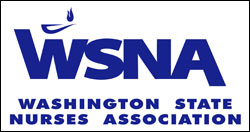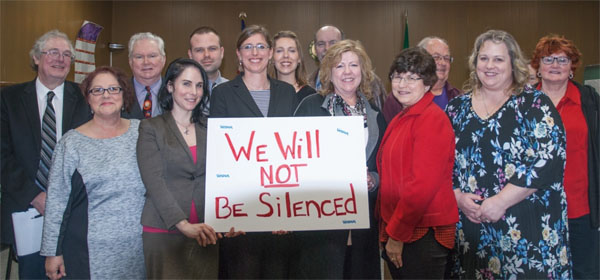LOCAL
Yakima Regional nurses win damages for unpaid work hours
The following is from the Washington State Nurses Association:
YAKIMA (Feb. 16, 2018) — In a major victory for home health and hospice nurses, Yakima County Superior Court Judge Blaine Gibson on Wednesday awarded damages of $2.895 million to home care nurses at Yakima Regional Medical and Cardiac Center for work done off the clock.
The Court ruled that Yakima Regional acted “knowingly, willfully, and with the intent to deprive” the nurses of pay for their hours worked and their missed meal breaks. The court ruled that because Yakima Regional’s state wage law violations were knowing and intentional, the nurses should be awarded twice the amount of back pay that they were denied. These damages for willful violations were awarded under RCW 49.52, which is a protective measure to assure payment to employees of wages they have earned.
“As nurses, we will not be deterred in giving our patients the care they need and deserve,” said Dan Campeau, RN, one of the nurses involved in the lawsuit. “Employers must be held accountable and nurses deserve to be paid for hours worked.”
Last Thursday, Feb. 8, Judge Gibson ruled that “overwhelming evidence” proved that Yakima HMA, LLC, known as Yakima Regional, broke state law when it forced its home care nurses to work substantial amounts of uncompensated time off the clock between April 21, 2012 and Aug. 31, 2017.
 The Washington State Nurses Association, the union representing the nurses, filed the lawsuit in April 2015. The evidence at the trial showed that Yakima Regional managers routinely paid nurses for eight hours of work a day, knowing that the nurses were regularly working additional hours to give patients the care they needed, complete required documentation and coordinate care with doctors and pharmacists.
The Washington State Nurses Association, the union representing the nurses, filed the lawsuit in April 2015. The evidence at the trial showed that Yakima Regional managers routinely paid nurses for eight hours of work a day, knowing that the nurses were regularly working additional hours to give patients the care they needed, complete required documentation and coordinate care with doctors and pharmacists.
After eight days of testimony, Judge Gibson ruled from the bench that Yakima Regional failed to keep accurate time records and pay the nurses for the hours they worked.
Nurses in the Medical Center’s home health and hospice programs care for patients in their homes. The home health nurses assist patients who need help to live independently, in many cases after major surgery. Hospice nurses care for patients diagnosed as terminally ill.
In evidence presented, nurses said they they were told by management that they wouldn’t be paid for additional work, like charting and coordinating care, or for care given to patients beyond their scheduled eight-hour shift.
Nurses said that given the nature of their work, when a patient could be nearing the end of their life or might have a setback that required additional time and attention, it was nearly impossible to fit their work into a rigid schedule and patient visit load. They were given no flexibility and were denied paid hours necessary to spend more time with a patient and family, even though they would never walk away from a patient in need.
Nurses who fought for pay for all hours worked were reprimanded.
“I can’t tell you how many times I was called in to my administrator’s office and yelled at, screamed at,” one nurse testified. At one point she was told, “if I didn’t like it I could find another job.” After complaining that she was tired of working overtime for free, another nurse testified she was told “you could turn in your resignation by email.”
Judge Gibson also ruled that the home care nurses were denied uninterrupted half-hour meal breaks, to which they are entitled by state law, on at least 90 percent of the days they worked long enough to be entitled to a meal break. The judge noted that to ensure that their patients received needed care in a timely way, and to complete all work required for each home health or hospice patient visit, including charting, the nurses had to work through their meal breaks, including to regularly to take telephone calls from physicians and pharmacists, because delaying those calls was not in the patients’ best interest. Otherwise, the judge noted, the nurses would end up “playing phone tag” while their patients suffered.
“This is a tremendous victory, not only for the nurses who were forced to work off the clock to give their patients the care they need, but for nurses across the state,” said Julia Barcott, RN, Chair of WSNA’s Cabinet on Economic and General Welfare. “It is really powerful to see what nurses standing together in unity can do for nurses and quality patient care – whether we’re in the courtroom, at the bargaining table or in the legislature.”
WSNA was represented in the trial by Jennifer Robbins and Laura Ewan of the law firm Schwerin Campbell Barnard Iglitzin & Lavitt.






